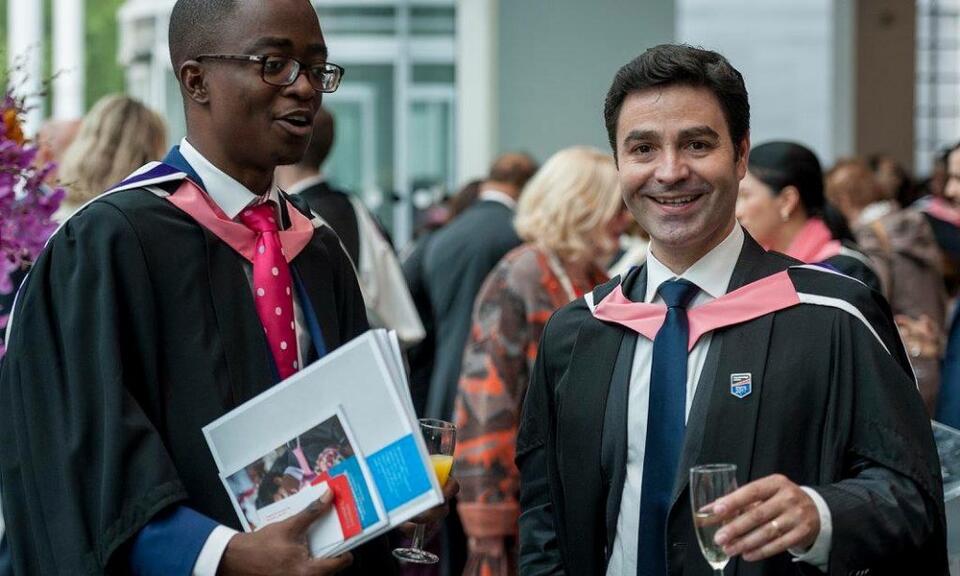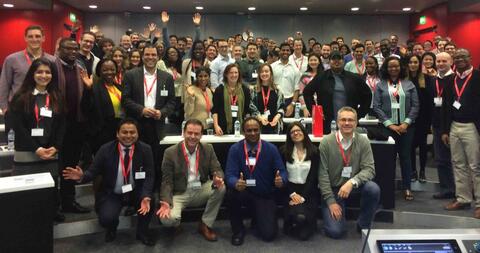
Published
Blog type
Ese Sifo (Ese (left) with a classmate on his Graduation Day) is the Senior Human Resources Business Partner at Lockheed Martin, a global aerospace, defence, security and advanced technologies company.
While completing his Global Online MBA in 2017, Ese moved companies and got promoted to a Senior Partner position towards the end of his studies. We speak to Ese about his career, MBA studies and get an insight into his industry.
1. You recently completed your Global Online MBA. Looking at the programme in retrospect, how have you grown from when you began your studies to now?
I’m a deeper critical thinker and I analyse problems from very different vantage points. I find I have incorporated my learning’s not only into my career but my family life as well. I have also started my own consulting firm and our module on Entrepreneurship definitely supported that venture.
2. During your studies, you moved from your position of Manager Talent Management at Phillips 66 to the HR Business Partner at Lockheed Martin. How did the MBA prepare you for this step-up in leadership?
One of the critical skillsets required for the HRBP role at Lockheed Martin was someone who could be a Change Management Agent. As a company, we focus on changing our culture to bring about the right results. I believe I was a natural fit for this role due in large part to the module/elective I took in Leading and Executing Strategic Change. The coursework I completed prepared me for the situations I encountered in the workplace. Analysing possible outcomes of implemented solutions in Grad School helped me to see that there is no one way of doing things. There are many effective ways and some not so effective ways, the choice is up to you.
3. You were then promoted at your company into a Senior Partner position. What role did your MBA play in securing this promotion?
The Global Online MBA programme was more of a simulator of what I would experience in the workplace; from managing complex work issues to managing diverse and unique personalities. By the time I made the transition to Lockheed Martin, I was performing well above my level and so the promotion was a natural progression for me.
4. How did you balance moving companies, location and roles while studying your MBA?
To be honest, the transition within roles and the move from one geographic region to another in the US were possible because I had a strong support system in my wife and kids. My wife gave me the chance to immerse myself in the programme and really became a front-line leader while I transitioned between jobs. I will say my support system was key to accomplishing these changes. I am very thankful to them.
5. What are the top three skills you learnt on the Global Online MBA that have been most useful to your career?
The first without a shadow of doubt was the Managing Negotiations elective. I am forever grateful to Jonathan Pinto for being a great lecturer and pushing us to fully understand the art of negotiating. I would also say thanks to Harry Patel, my opponent in one of my class projects. He was so hard on me and I felt so hard done that I vowed to never leave anything on the table anymore when it comes to negotiations (laughs).
There were several others but I would say the ones that stood out given the nature of my career were Change Management and Entrepreneurship core modules. I find that I am most effective as a Business Partner when I think with the mind of an entrepreneur.
6. One of the key aspects of the Global Online MBA is the Personal Leadership Journey. How did your leadership journey develop on the MBA and what were the parts of the programme helped with this journey?
The Personal Leadership Journey (PLJ) was an eye-opener for me because it really allowed me to reflect on what type of leader I am. Since then, I have come to accept that I am more of an inspirational leader. At Lockheed Martin, we talk about servant leadership and it is amazing to me how much my PLJ covered facets of this at Imperial. My advice to people considering this programme is that the PLJ is essential to realising who you are; your strengths and developmental areas. This self-reflection becomes a defining moment for your career once you complete the MBA.
7. Lockheed Martin is in the aerospace, defence and security industry. What is the main challenge facing this industry and how are you working to combat it?
It seems strange but, a few years ago, I would have said our competition was maybe Northrop Grumman or a company as big as that. Nowadays, our competition is the little drone company founded out of someone’s garage in a small town. The industry is changing so fast and to remain number one, we are relying more and more on our innovation, and trying to see things from an unconventional perspective. Don’t get me wrong, companies like Google and Tesla are also mounting a challenge in our industry with some of their new programmes as well. Our advantage is our people. We are always looking for ways to attract, develop and retain the brightest minds.
8. While studying your Global Online MBA, how did you find using the online learning platform, The Hub?
I had my apprehensions initially but I was really blown away by the ease with which The Hub worked. It allowed for me to turn any location into my classroom environment. For a father of two young boys, this was key to me being able to fit my family and work life with my study commitments. I really enjoyed The Hub. I actually miss it now.
9. What advice would you give to someone who was thinking about applying for the Global Online MBA?
The Global Online MBA requires a lot of commitment and hard work. It has the capability to transform one’s career and really propel you to greater heights. You will truly be a part of a global team from all hues of backgrounds and industries. You will be working with very tight deadlines and schedules across multiple time zones but you will have amazing support from staff every step of the way… Well, what are you waiting for? Apply!!!!
10. Why did you choose Imperial and more importantly, did it live up to your expectations?
As someone who already has a Master’s in Finance, I was very specific about what I wanted from an MBA. I wanted to be a part of an Ivy League school with rich tradition and an alumni network that would be global and accepting of my diverse background, culture and skill sets. Imperial College Business School delivered everything and more. It is my hope that my sons will continue the Imperial tradition also.

